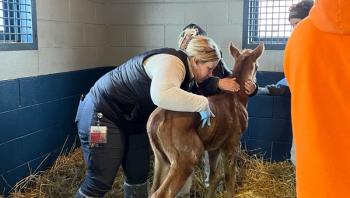
AVMA turns back on forced molting
PHILADELPHIA-American Veterinary Medical Association (AVMA) delegates have positioned the group against the forced molting of layer hens, adopting the crux of a resolution that's been nixed by the policy makers for six consecutive years.
PHILADELPHIA- American Veterinary medical Association (AVMA) delegates have positioned the group against the forced molting of layer hens, adopting the crux of resolution that's been nixed by the policy makers for six consecutive years.
The resolution, spearheaded by the Association of Veterinarians for Animal Rights (AVAR), took on a last-minute rewrite by the American Association of Avian Pathologists (AAAP) during the AVMA House of Delegates meeting in Philadelphia in July. The impromptu move came after it became clear a majority of delegates no longer favored the widespread farming practice.
AAAP officials claim unprecedented constituent support of the activists' resolution played no role in the group's seemingly sudden policy change. Rather, the recent release of scientific evidence showing food withdrawal is no longer needed to induce a molt spurred the unexpected position, leaders say.
"I think it addresses the science and addresses the emotion of those who've come out against forced molting," says Massachusetts delegate Dr. John DeJong, referring to the American Association of Avian Pathologists' impromptu resolution against the practice.
After participating in a breakout meeting to consider AVAR's resolution, New Jersey Delegate Dr. Robert Gordon says he was "shocked" by the apparent about-face.
"Our reference committee passed the AVAR resolution that night, and the next morning AAAP had written a replacement," he says. "What surprised me most was the fact that AVMA-established procedures for introducing resolutions were modified for this. My feeling is that the avian pathologists obviously didn't want AVMA adopting an activist-written resolution. Either way, I'm happy the House of Delegates took this stand."
Planned all along
While the AAAP move might appear pressured, association delegate Y. Mo Saif, DVM, insists the measure was well planned.
United Egg Producers lead way
"The poultry veterinarians represented by AAAP had been essentially staying on top of this whole issue on forced molting," says Saif, head of the Food Animal Health Research Program at The Ohio State University. "Up until recently, there were really no other satisfactory efforts to induce a forced molt, but lately industry has come out with some new ways. In the last year or so, we've reviewed these and decided it's about time that we not use feed withdrawal."
AAAP approved the new resolution right before the AVMA meeting, he adds.
"The plan was to introduce it at some time, as early as possible," Saif says. "Now we no longer recommend feed withdrawal. Our decision came down to considering the science."
Research behind the move
The science behind feed withdrawal stems from unpublished work by United States Department of Agriculture immunologist Peter Holt as well as a 2003 joint research project by North Carolina State University and universities of Illinois and Nebraska, which found that feeding foul low-protein wheat midds can induce molt, eliminating the need for feed withdrawal.
"It appears there is research to suggest alternatives to forced molting that seem to be viable," says Gail Golab, DVM, Ph.D., assistant director of the AVMA Education and Research Division. "But there's a big difference between viable and commercially viable."
Single goal
Whether or not producers adopt forced molting alternatives remain to be seen, but the existence of science-based options spurred the association's delegates to vote overwhelmingly for change. While the late-breaking resolution was more verbose than AVAR's original, its fundamentals can be summed in one sentence: "Neither food nor water should be withdrawn."
Dr. Tom Burkgren, executive director of the American Association of Swine Veterinarians says he's relieved delegates didn't pass the AVAR-authored change.
"The key was that it came from AAAP and that it didn't come from AVAR," Burkgren says. "It's important that this came from the scientists and not the antis. It's a matter of using science."
Moving on
AVAR's authorship isn't on the resolution, but the association Vice President Holly Cheever says she doesn't care.
"If AAAP wants to capture the flag and claim authorship, that's fine," she says. "What's important is that this passed. AVAR does not need the credit."
Newsletter
From exam room tips to practice management insights, get trusted veterinary news delivered straight to your inbox—subscribe to dvm360.





